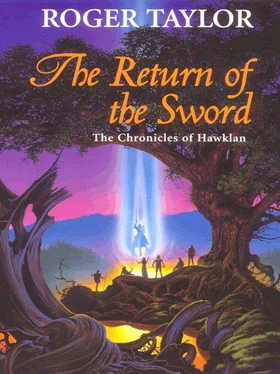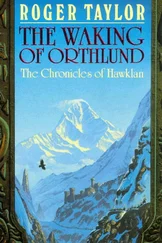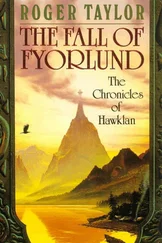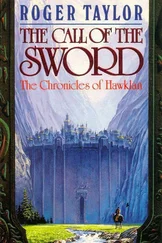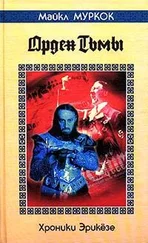Roger Taylor - The Return of the Sword
Здесь есть возможность читать онлайн «Roger Taylor - The Return of the Sword» весь текст электронной книги совершенно бесплатно (целиком полную версию без сокращений). В некоторых случаях можно слушать аудио, скачать через торрент в формате fb2 и присутствует краткое содержание. Жанр: Фэнтези, на английском языке. Описание произведения, (предисловие) а так же отзывы посетителей доступны на портале библиотеки ЛибКат.
- Название:The Return of the Sword
- Автор:
- Жанр:
- Год:неизвестен
- ISBN:нет данных
- Рейтинг книги:4 / 5. Голосов: 1
-
Избранное:Добавить в избранное
- Отзывы:
-
Ваша оценка:
- 80
- 1
- 2
- 3
- 4
- 5
The Return of the Sword: краткое содержание, описание и аннотация
Предлагаем к чтению аннотацию, описание, краткое содержание или предисловие (зависит от того, что написал сам автор книги «The Return of the Sword»). Если вы не нашли необходимую информацию о книге — напишите в комментариях, мы постараемся отыскать её.
The Return of the Sword — читать онлайн бесплатно полную книгу (весь текст) целиком
Ниже представлен текст книги, разбитый по страницам. Система сохранения места последней прочитанной страницы, позволяет с удобством читать онлайн бесплатно книгу «The Return of the Sword», без необходимости каждый раз заново искать на чём Вы остановились. Поставьте закладку, и сможете в любой момент перейти на страницу, на которой закончили чтение.
Интервал:
Закладка:
Fortunately, though disconcerting, it should have been of no pressing significance. It was something that would manifest itself in the world very rarely and then only fleetingly and in the smallest ways. But now there were signs that for some reason it was growing, signs that it might manifest itself much more conspicuously, that it might bring great destruction. And, too, there were indications that something else was pending, something rare and ominous, though whether the two happenings were associated could not be determined.
Andawyr growled irritably and threw another stone into the stream. He was ploughing the old ruts again after all. He had come out here to clear his mind, to rid himself of its interminable circling arguments and now he was teetering back to them again. He felt as though he were trapped in an hourglass, scrabbling to escape the sand being drawn inexorably to the centre.
Abruptly he let the thoughts go. He was sufficiently aware of his own way of thinking to know that he had reached a stage where pounding incessantly at the problem would merely drive any solution deeper into hiding. Like a shrewd predator, all he could do now was mentally wander off – do something else – anything else – knowing that eventually the prey would quietly reappear, probably quite unexpectedly. He smiled broadly and looked again at the stream. The sunlight sparkling off it in endlessly varying patterns and its clattering progress down the hillside were indeed an antidote for his preoccupations.
As he watched the stream, his gaze was drawn to a ripple piled up over a large stone. It wobbled from side to side as if trying to shake itself loose, but generally it maintained its shape and position. Tongue protruding, Andawyr tossed a pebble towards it. It missed. He closed one eye, put out his tongue a little further and tried again.
This time the pebble landed squarely in the ripple with a satisfying plop. As he had known it would, nothing happened apart from a few bubbles drifting to the surface and floating away. The ripple would only change if the rock that was causing it was moved, and then another would form elsewhere. Until that happened, the ripple would remain unchanged while changing constantly; indeed, it could not exist without that change – who could shape still water thus? From his sunny vantage, Andawyr could see many such ripples in the stream. And other parts, which, though fed by smooth, untroubled waters, were turbulent and disordered, never settling into any single pattern.
This stream’s cleverer than I am, he thought. Without a moment’s thought it knows how to form strange and complex shapes that I couldn’t predict if I did calculations for a year. The idea amused him. It was the kind of example he delighted in slapping his students’ faces with when they became either too involved in something or too sure of themselves.
Forget it, he reminded himself, putting his hands behind his head and lying back on the soft turf. Get on with your wandering.
And wander he did. But though he assiduously avoided the concerns that had sent him out of the Cadwanen for relief, the thoughts that came to him were scarcely lighter as he found himself pondering the Second Coming of Sumeral and all the changes that had happened since His defeat.
The Orthlundyn, for example, were now like a people awakened from a long sleep. They travelled far and wide and had a seemingly insatiable thirst for knowledge. They had become very much the guiding spirit of the Congress that followed the war. The Fyordyn, by contrast, were less steady, less confident than they had been; cruelly hurt by the civil war that had followed Oklar’s murder of their king and his near-success in seizing power for his Master. A lesser people might well have descended into a spiral of disintegration, but many things sustained them through their trials, not least their finally having come together to face Sumeral’s terrible army in Narsindal. And, too, their almost universal affection for their queen, Sylvriss, and her son Rgoric, named after his ill-fated father. Less emotively, the Geadrol, the Queen’s Council of Lords, the actual government of Fyorlund, also played no small part, with the stern, truth-searching discipline of its deliberations. The Riddinvolk, with their fanatical love of horses and riding, seemed to be the least changed, but even they felt the guilt of their failure to note the return of Sumeral.
And what about the Cadwanol? Andawyr thought as the old memories rehearsed themselves again. Where do we stand in this great analysis?
Like all the others, wiser by far, he supposed. Wiser in their understanding of themselves, and certainly much wiser in the ways of the Power. First there had been the shock of accepting what had happened, and the ordeal of their frantic and futile search for Ethriss. Then, while his fellow Cadwanwr had stood on the battlefield, using their skills to protect the army against the Power used by Sumeral’s lieutenants, His Uhriel, Andawyr himself had accompanied Hawklan and his companions to the very edge of Lake Kedrieth in the middle of which Derras Ustramel had arisen again. Despite the sunlight, Andawyr shivered at the memory of Sumeral’s presence in that place. For him, it had hung in the air as tangibly as the mist that shrouded that awful lake.
Such experiences brought insights in a way that nothing else could and subsequently, in quieter times, many old, intractable problems had been solved with an almost embarrassing ease.
The memory of Hawklan brought the healer’s words back to Andawyr. ‘There is no healing for this, any more than there is truly for any hurt. Time will blur and cloud the memory of the pain, but your lives cannot be as they were. Make of it a learning and you will become whole, and worthy teachers of your children. Cherish it as a grievance and you will twist and turn through your lives seeing only your own needs, and burdening all around you.’ Wise words, timely uttered. Words that had proved to be a healing salve for many.
‘Always the healer, Hawklan,’ Andawyr said quietly. ‘Always the healer.’
Hawklan’s touch perhaps more than any other single thing had ensured that killing hands were stayed after the battle. Without doubt it had ensured that the three allied nations determined to learn what they could about the dank land of Narsindal and its wild inhabitants, the Mandrocs, rather than simply crushing them in a war of mindless vengeance.
Andawyr propped himself on his elbows again. It was a long time since he had thought of Hawklan. He clicked his tongue. Everywhere he looked, paradoxes. In his studies, in the little rock-formed ripple where water flowed upwards, even in what he was doing now – ignoring his questions in order to answer them. And now, Hawklan. Healer, warrior, ancient prince – what was he? How had he come to this place, this time? Andawyr let the questions go. They might well be intriguing, but they were neither new nor answerable. What Hawklan knew of himself he had shared freely, and that had raised more questions than answers. Besides, attempting to analyse a friend thus was somehow distasteful. It had to be sufficient that he had been there. More than sufficient. For what would have happened without him? He had been pivotal. He it was who had appeared out of the mountains years before and opened Anderras Darion, Ethriss’s great fortress in Orthlund. And it was the opened Anderras Darion that had disturbed Oklar into the precipitate and reckless actions that had led ultimately to the exposure and downfall of his Master. Hawklan’s quiet words had affected so many decisions. And, in the end, it was Hawklan that Sumeral had sought, not to destroy but to turn to His cause.
Pivotal.
The word lodged in Andawyr’s mind.
Why would he perceive Hawklan in this way? It was not something that Hawklan would have claimed for himself. He was always a reluctant leader. And, logically, Andawyr knew well enough that any one of the countless actions and decisions made by countless people at that time would have brought about a different outcome. It was rarely possible to trace a single line of cause and effect to any one happening, and least of all in the chaos of armed conflict, where chance ran amok. As someone had once said to him, ‘Ifs were strewn everywhere.’
Читать дальшеИнтервал:
Закладка:
Похожие книги на «The Return of the Sword»
Представляем Вашему вниманию похожие книги на «The Return of the Sword» списком для выбора. Мы отобрали схожую по названию и смыслу литературу в надежде предоставить читателям больше вариантов отыскать новые, интересные, ещё непрочитанные произведения.
Обсуждение, отзывы о книге «The Return of the Sword» и просто собственные мнения читателей. Оставьте ваши комментарии, напишите, что Вы думаете о произведении, его смысле или главных героях. Укажите что конкретно понравилось, а что нет, и почему Вы так считаете.
